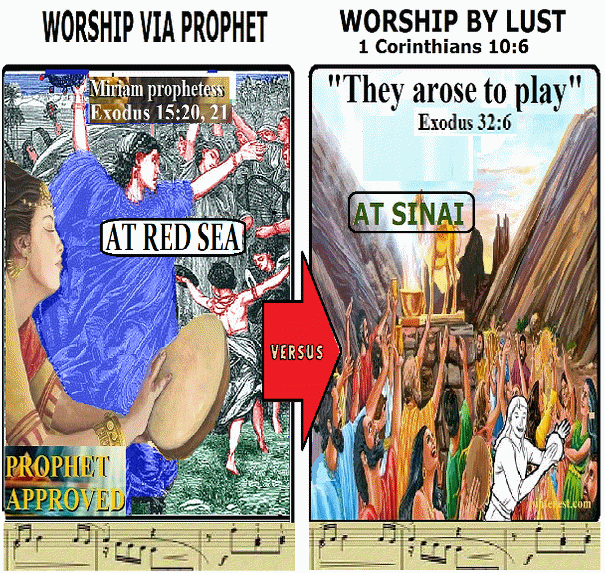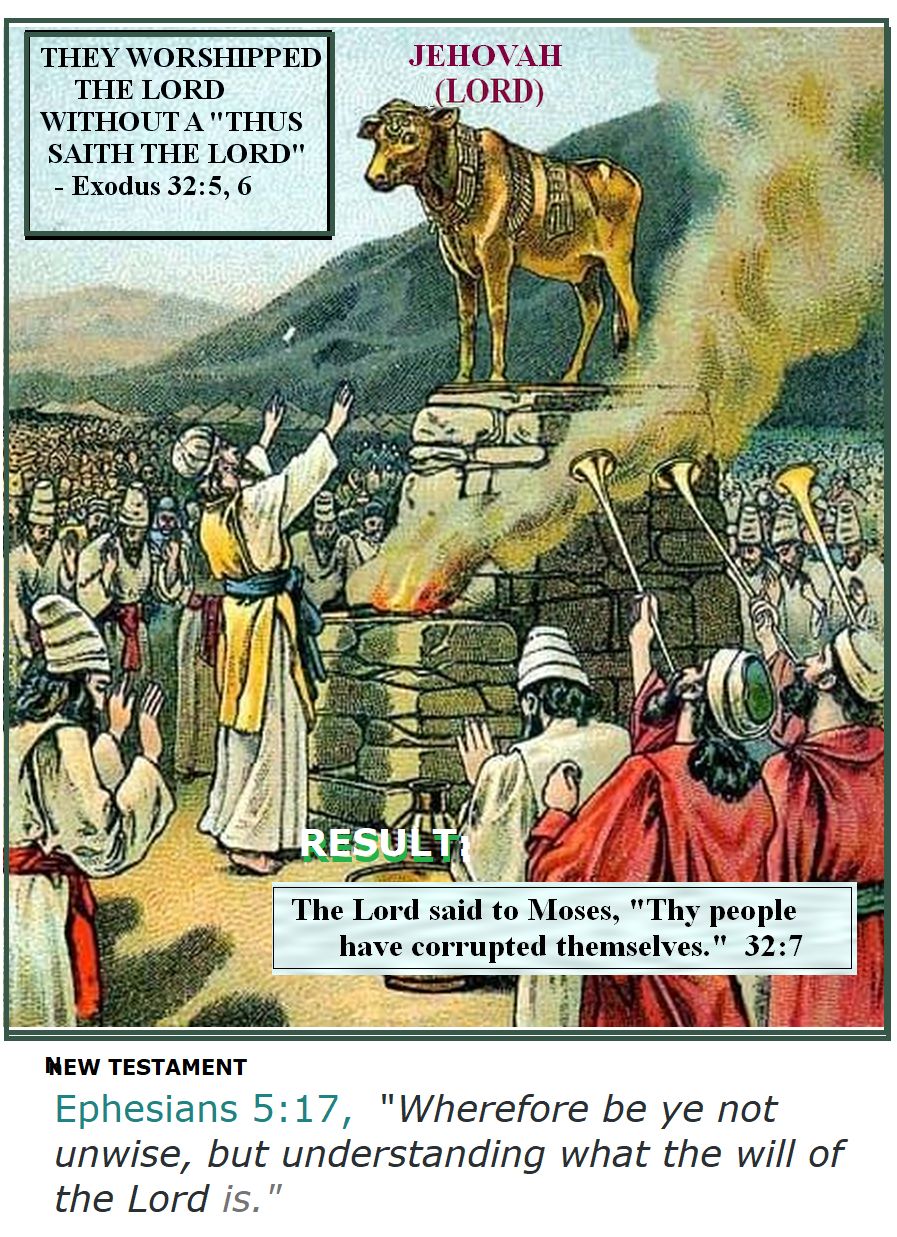
#8: AND THEY AROSE TO PLAY
1 Corinthians 10:1-7; Exodus 32:7-8
“That ye may with one mind and one mouth glorify God, even the Father of our Lord Jesus Christ” (Romans 15:6).


DOES GOD HATE MECHANICAL INSTRUMENTS? Does God actually hate mechanical instruments? An advocate for adding instrumental music to NT church worship accused opponents as teaching that God hated mechanical instruments. Is it that God hates such instruments? A more important question for us: has God ever accepted mechanical instruments in worship? Does He now? How can we know?
GOD CREATED EVERYTHING. Why would He hate His creation? It would be contradictory, I think, to say that God hates anything that He's created. Indeed, the earth and everything in it are the Lord's (Psalm 21:4) which Creation He judged “very good” and this was in the beginning (Genesis 1:31). Should this not include the blessings that God granted for humans to enjoy? Should it not include the ability to manufacture and enjoy music? Jabal was the father of such as dwell in tents and raise cattle (Genesis 4:20). Although Jabal was a descendant of Cain, his livelihood was obviously not tainted by such. The same therefore should apply to his brother, Jubal, who was the “father of all such as handle the harp and organ” (4:21). That is, "he was the father of all players on instruments of music” (BBE) with no further Biblical comment.
Did God ever accept musical instruments in worship? Yes. Did God ever accept animal sacrifices in worship? Yes. Did you know that He accepted dancing in worship as well? How do we know what God accepts? "Walk as children of light: … Proving what is acceptable unto the Lord” (Ephesians 5:8b-10, NT).
GOD'S PROPHETS TELL US WHAT'S ACCEPTED. Men know God's will from His prophets and prophetesses (2 Peter 1:21). Moses was a prophet. He prophesied that there would be other prophets from God which we know included Jesus (Deuteronomy 18:15). God defined a “prophet” to Moses in Exodus 4:16; 7:1 as "a mouth for God." Women like the judge Deborah (Judges 4:4) and yes, Moses' sister Miriam (Exodus 15:20) served as inspired “mouths” for God. Prophets tell us what's authorized by God. Teachers of the prophet's words, by the way, are not the same as prophets of God. In a strict sense they serve only as "spokesmen" for the prophets like Aaron did for God's personal prophet Moses (Exodus 7:1, 2).
MIRIAM, A PROPHET[ESS]. The Scriptures accentuate specifically in the text of Exodus 15 that Miriam was a prophetess. According to the Strong's Hebrew Dictionary, a prophetessH3031 is “Feminine of prophet; a prophetess or (generally) inspired woman.” We know that Miriam and the ladies danced to the sound of timbrels (Exodus 15:20, 21) after God delivered them from the Egyptians. Like Moses, she was a prophet of God (Exodus 4:16; 7:1) and in this context expressed what pleased God. Women like the "judge" Deborah (Judges 4:4) and Moses' sister Miriam served also as inspired “mouths” for God just as some men.
GOD DID ACCEPT MECHANICAL INSTRUMENTS during the time He accepted animal sacrifices in Jerusalem! Jews are hoping to restore such animal sacrificial worship in Jerusalem in 2020. But we need to keep this in mind: God accepted animal sacrifices according to His instructions and He has not accepted them since Jesus died on the cross. Very few religions practice animal sacrifices in our century. The prophet Samuel declared, “Behold, to obey is better than sacrifice, and to hearken than the fat of rams” (1 Samuel 15:22b). That is, doing what God wants of us is what is important, and not what we want Him to want from us.
JERUSALEM EVENTUALLY BECOMES EXCLUSIVE. God's instructions eventually included authority for mechanical music and dancing for the Temple. But God authorized only the Levites to conduct this music along with dancing to accompany animal sacrifices in the Temple (Psalm 149:3; 150:4). Once God placed His name at Jerusalem and the Temple was built by Solomon such worship was authorized for Jerusalem only (Deuteronomy 12:5, 11, 21; 14:23; 16:2-11). Even the prior accepted "high places" were thereafter condemned (1 Kings 3:2; 2 Kings 18:22). One of Solomon's sins was his keeping the high places. Samaria's worship was condemned (1 Kings 13:32; Amos 5 & 6). The Law thereafter limited true worship to the Temple once God had placed His name there! All of this worship would have ceased at the cross when the Law was abrogated (Colossians 2:14; Ephesians 2:15). The Bible calls the authors of this commanded music “prophets” and “seers” of God (2 Chronicles 29:24-30). "And he set the Levites in the house of the LORD with cymbals, with psalteries, and with harps, according to the commandment of David, and of Gad the king's seer, and Nathan the prophet: for so was the commandment of the LORD by his prophets” (29:25).
PSALMS IN OT. The Psalms are prophet-inspired songs for the Old Testament Law and were not intended as such for New Testament worship.i Jesus bound the Psalms together with the Law and Prophets as being "fulfilled" in Him: "All things must be fulfilled,ii which were written in the law of Moses, and in the Prophets, and in the Psalms, concerning me” (Luke 24:44b). David the prophet authorized, “ ... the Levites to sing praise to the LORD, with the words of David, and of Asaph the seer. And they sang praises with gladness, and they bowed their heads and worshiped” (2 Chronicles 29:30b).
PRIOR TO DAVID AND THE TEMPLE. Acceptable dancing and musical instruments were originally authorized for the women by the prophetess Miriam (Exodus 15:20) when Israel had miraculously and safely escaped across the Sea. This was followed by Samuel's school of male prophets (1 Samuel 10:5). Samuel was himself a prophet of God.
WHEN GOD REJECTED ISRAEL'S MUSIC AS "EVIL." It occurred while Moses and Joshua were in the Mount receiving the Ten Commandments.
“But with many of them God was not well pleased: for they were overthrown in the wilderness. Now these things were our examples, to the intent we should not lust after evil things, as they also lusted. Neither be ye idolaters, as were some of them; as it is written, The people sat down to eat and drink, and rose up to play” (1 Corinthians 10:5-7).
God loves us; and God loved Israel. But God destroys the disobedient. Numbers of Israel are overthrown in the wilderness as an example to us that we should not lust after evil as they lusted. Their sacrificing, eating and rising up to play is called "idolatry" by the apostle Paul in 1 Corinthians 10. We understand that worshipping an image is idolatry but when Paul referenced their evil at Sinai, he quoted their actions as idolatry "as it is written, 'they ate and then rose up to play.'" Their category of worship was listed under "lust."
ISRAEL LUSTED AFTER EVIL. The ancient Israelites had been baptized unto Moses in the cloud and in the sea. They ate the same miraculous food and continuously drank of the miraculous rock who was the Messiah, Jesus. But afterwards God was displeased with many of them. Why? They lusted after evil things. How? They made a golden calf, sacrificed to it in the name of the true Deliverer and God Elohim (Exodus 32:4; Genesis 1:1)iii, Do people do things like that today? They committed "idolatry" when they sat down to feast upon the sacrifice and then rose up to "play" ("sport", Exodus 32:5). When Moses and Joshua came down, they heard the sound of songs (BBE) and they saw the image and people dancing (Exodus 32:18, 19). It included "their choice of" worship. This specific activity in song and dancing was not authorized by God. It was a result of their "evil" desire. We "must not lust after evil" like they did. Can we worship Elohim according to our wants and desires? The apostle's answer would be, "No."
A new religion had come to town. I was eating in a lunchroom with a participant. He urged me to go to the services. He said that I wouldn't find music any better at a honky tonk. Now as a child I knew what a honky tonk referred to and it wasn't authorized music for worship to the True God.
WHAT DOES GOD REALLY HATE? It wasn't that God “hated” the precious earthly metals and things of earth, nor sacrificing as such, nor the “dancing” for God EVENTUALLY authorized the glorious worship of the Tabernacle/Temple (glorious to us; but glorious to God because He commanded it).iv The tabernacle/temple was ladened with gold which would be worth someone says over $13 million today.v "And Solomon made all the vessels that [pertained] unto the house of the LORD: the altar of gold, and the table of gold, whereupon the showbread [was]" (1 Kings 7:48). So it wasn't that God did not like pretty gold. And it wasn't just that He did not like images representing oxen for He allowed brazen oxen in the Temple supporting the molten sea [but these did not pretend to represent God]. "It [the Basin or Sea] stood upon twelve oxen" (1 Kings 7:25). Without God's instructions, anything would be according to human lusts.
Their sin basically then was in designing their own wants for worship without God's endorsement.vi This included the image but the image violation was not the only thing condemned.
The apostle says, "Now these things were our examples, to the intent we should not lust after evil things, as they also lusted” (1 Corinthians 10:6). Lust: “to set the heart upon, that is, long for.” “Neither be idolaters” (1 Corinthians 10:7) “Covetousness, (Thayer: "greedy lust") which is idolatry:” (Colossians 3:5).
THE QUESTION SHOULD NOT BE, "Does God hate instrumental music?" It ought to be whether His authority includes accepting the instruments in worship by the New Testament church which Jesus died for (Ephesians 5:1-25) and is Head and King of? Shouldn't we ask the question, "What does God want and expect the church, and hence us today, to do to honor him in worship?" Only the New Testament Apostles and Prophets who are guided by God's Spirit have the answer for us (Ephesians 3:5). How can we otherwise glorify our God, the Father of our Lord Jesus Christ?
--Gaylon West
THROW OUT THE LIFELINE
edited by Janie R. Ward and Mary L. West. Thanks.
i Jesus fulfilled all the Old Testament Scriptures: Luke 22:44 ; He nailed the Law to the cross: “Blotting out the handwriting of ordinances that was against us, which was contrary to us, and took it out of the way, nailing it to his cross” (Colossians 2:14).
ii Matthew 5:17 “Think not that I am come to destroy the law, or the prophets: I am not come to destroy, but to fulfil.” Luke_24:44 “And he said unto them, These are the words which I spake unto you, while I was yet with you, that all things must be fulfilled, which were written in the law of Moses, and in the prophets, and in the psalms, concerning me.”
iii Covetousness itself is called idolatry, Colossians 3:5.
iv The beautiful gold-plated acacia chest, the ark of the covenant, This was worship devised by them and was, according to Paul, authorized by the people's “lust,” hence, it was worshipping another “deity” in their “greedy covetousness” which is idolatry (Colossians 3:5). They had devised their sitting down to eat and their rising up to play from their own lust (1 Corinthians 10:1-10).
v http://www.templemount.org/TMTRS.html
vi The beautiful gold-plated acacia chest, the ark of the covenant, No, this was worship devised by them and was, according to Paul, authorized by the people's “lust,” hence, it was worshipping another “deity” in their “greedy covetousness” which is idolatry (Colossians 3:5). They had devised their sitting down to eat and their rising up to play from their own lust (1 Corinthians 10:1-10).

|